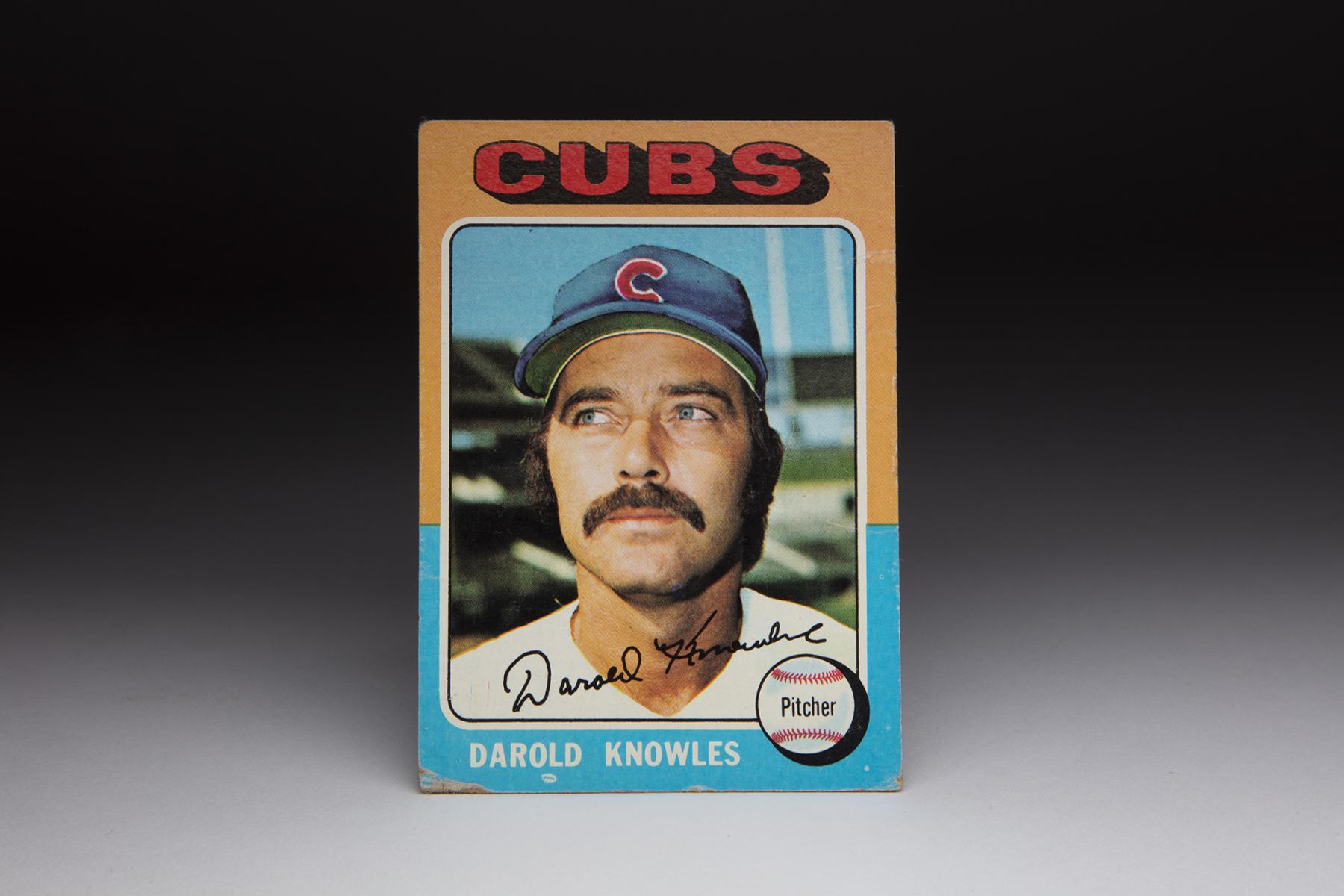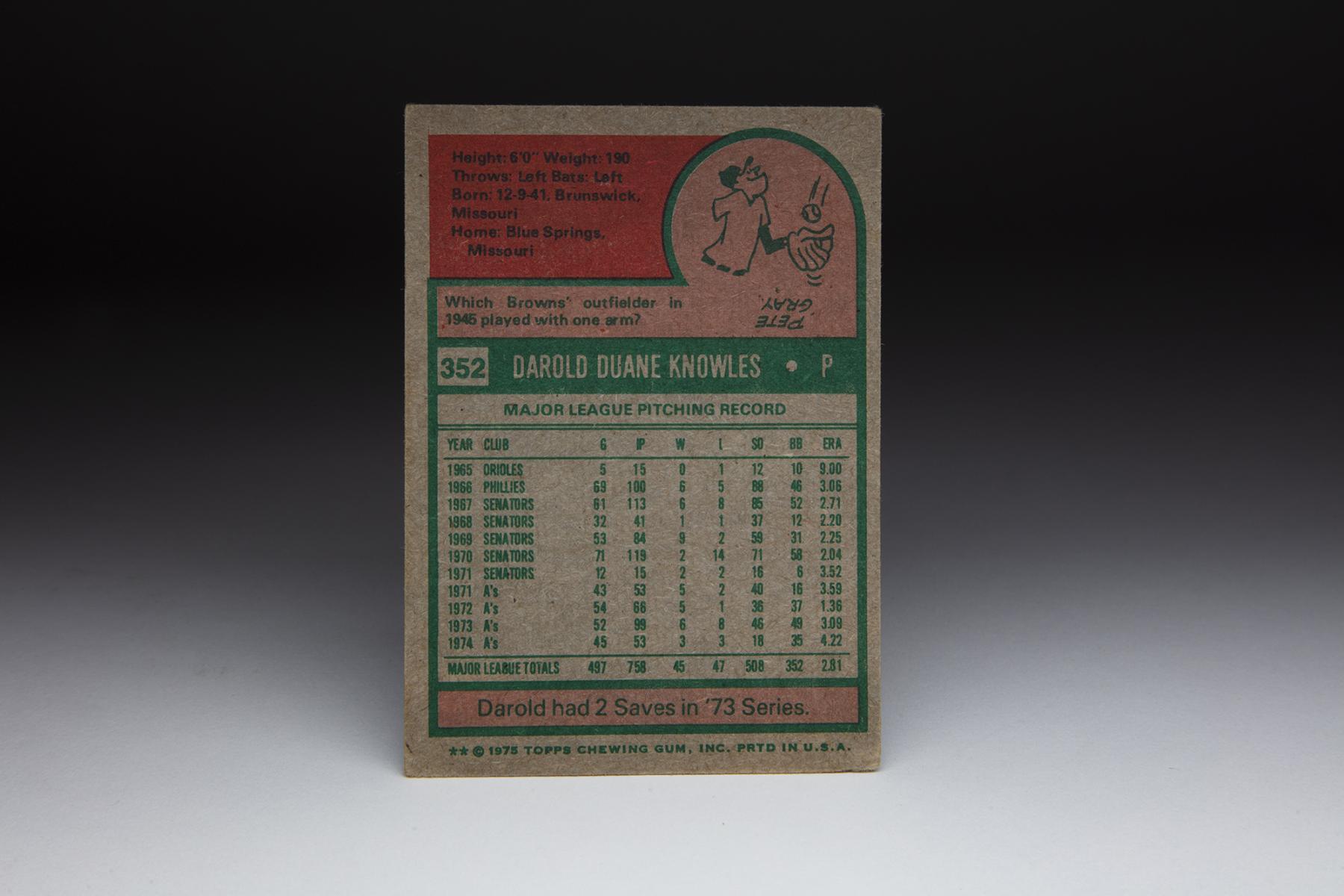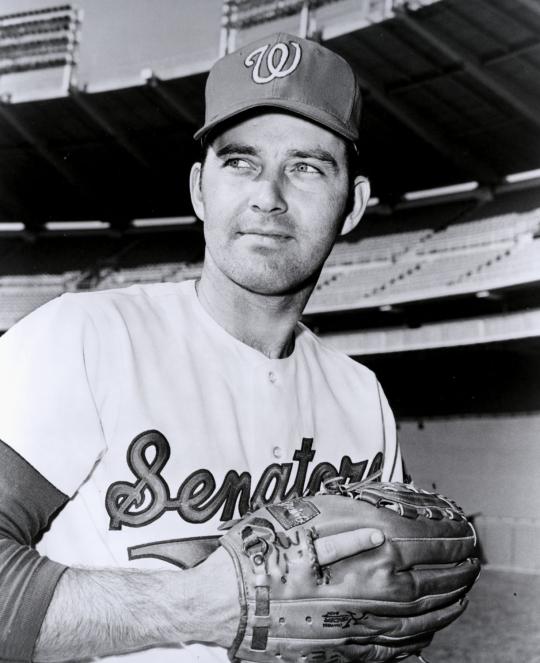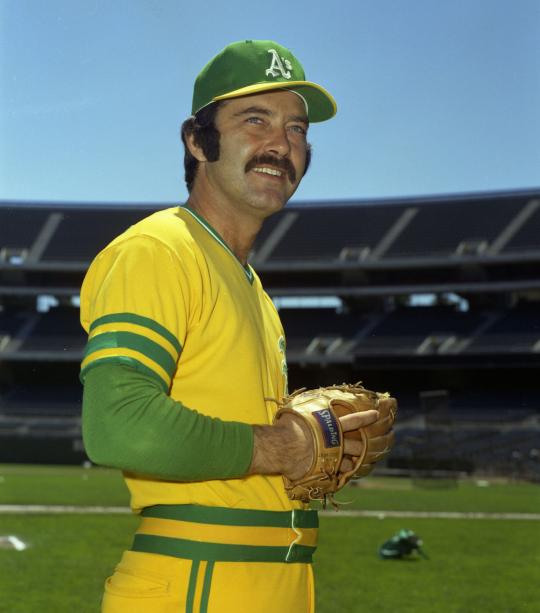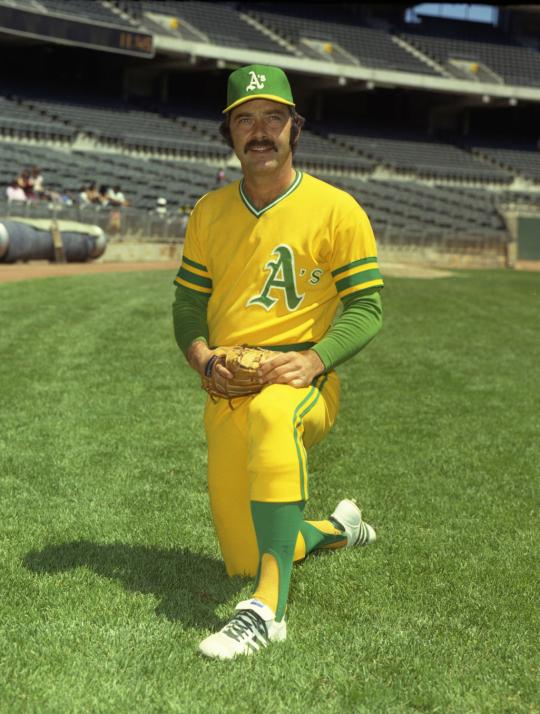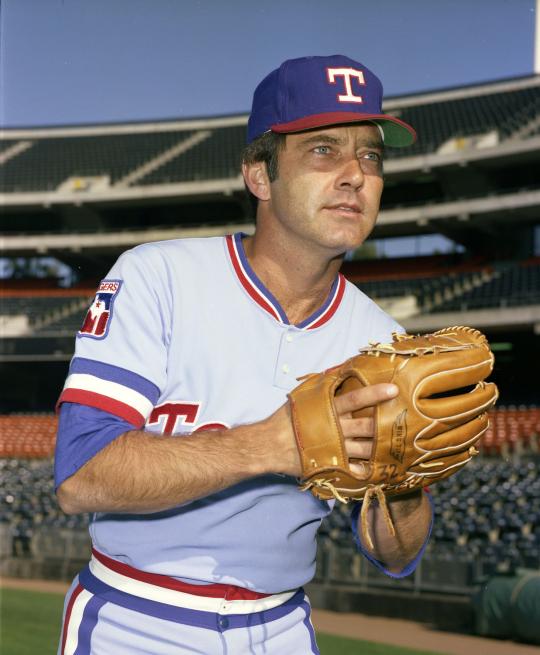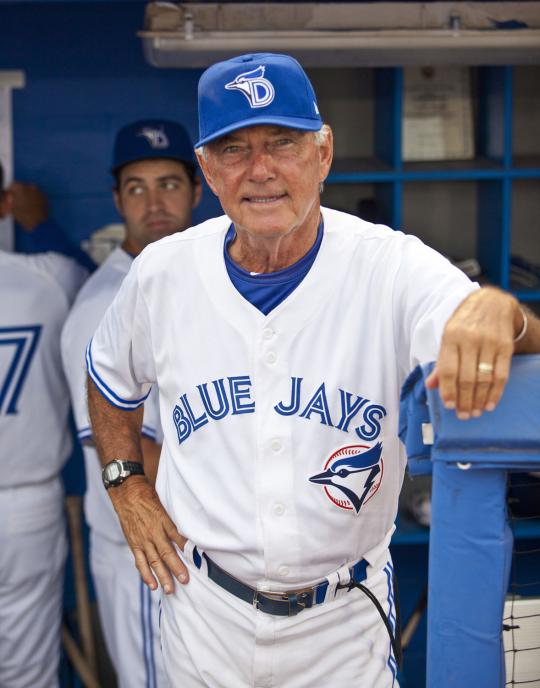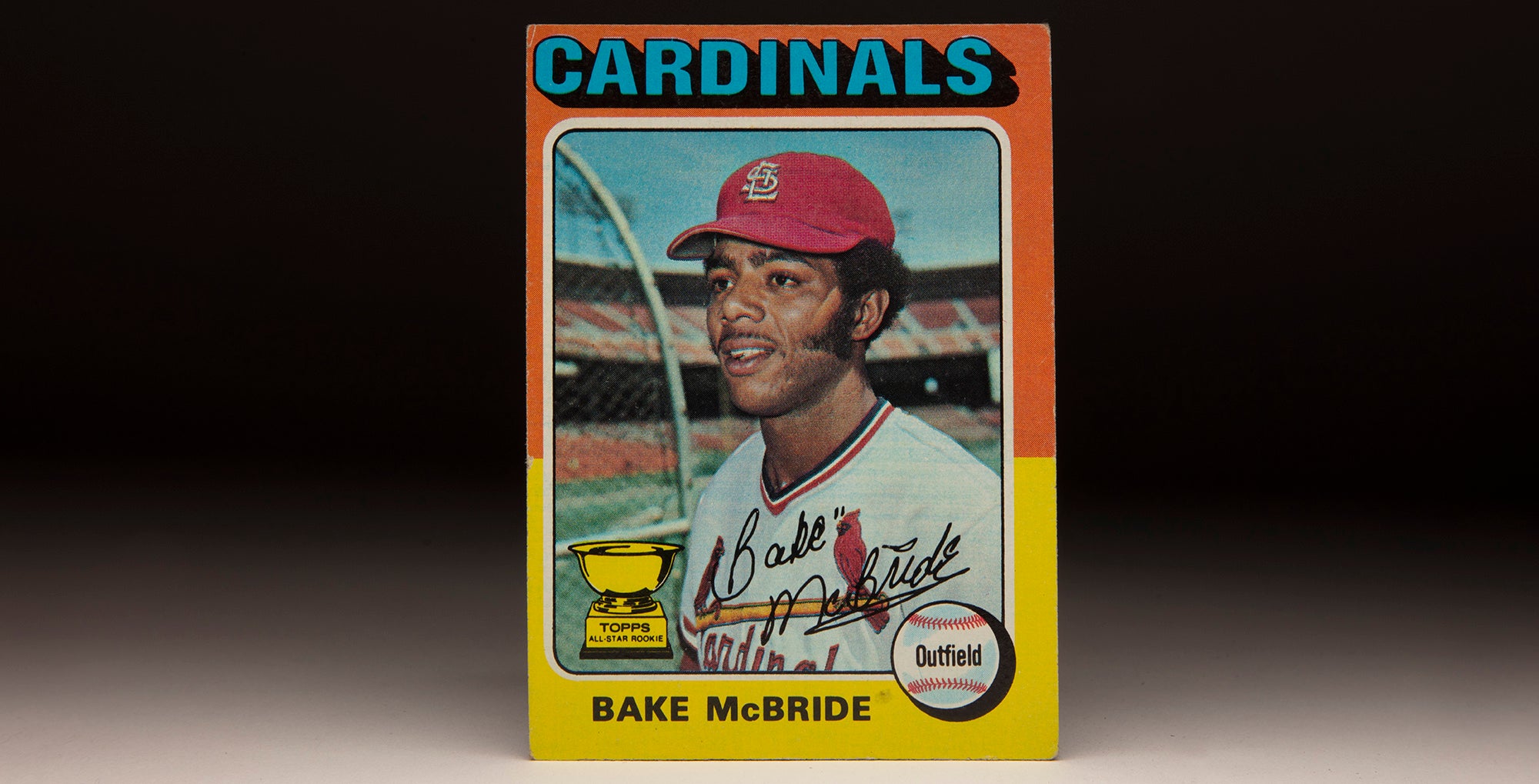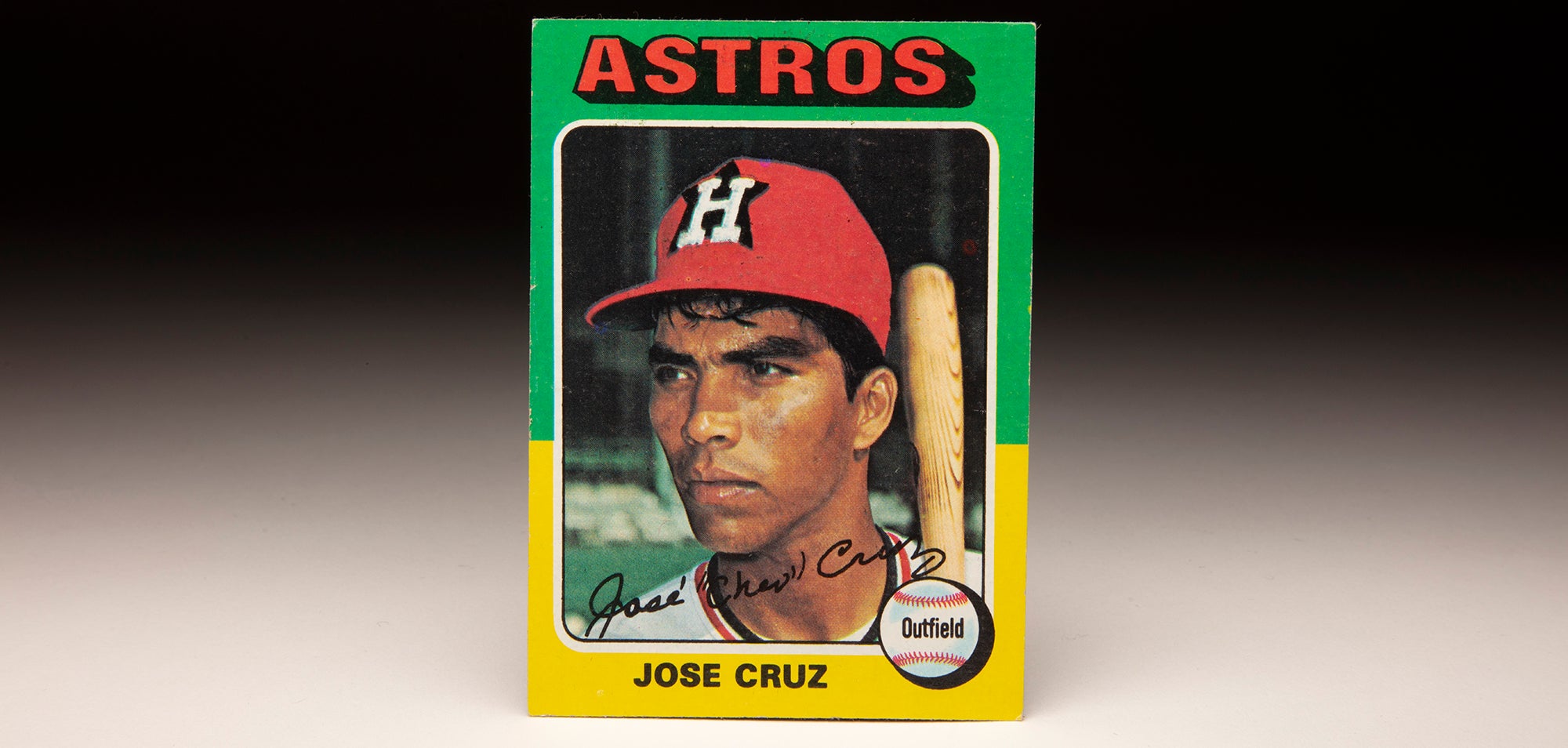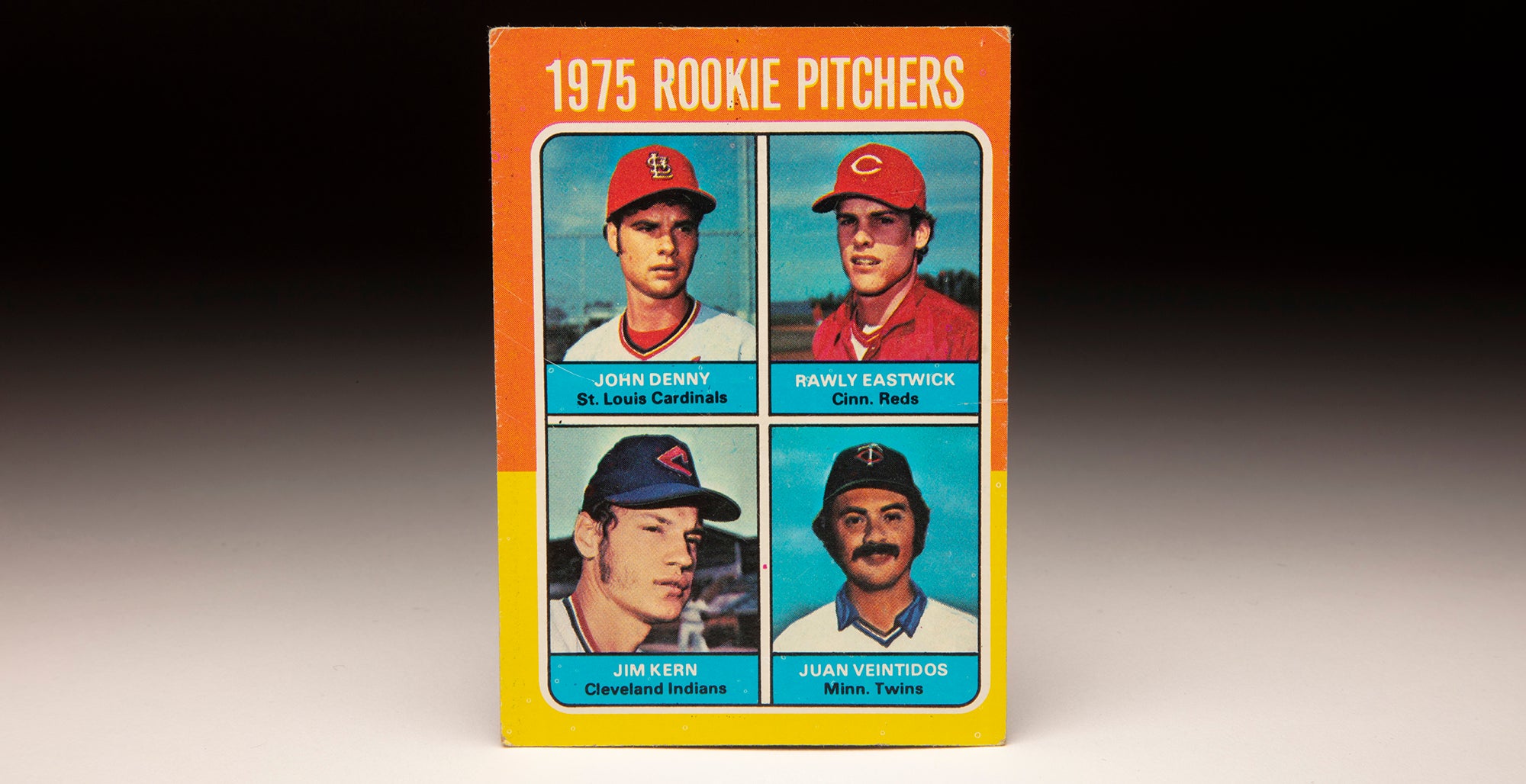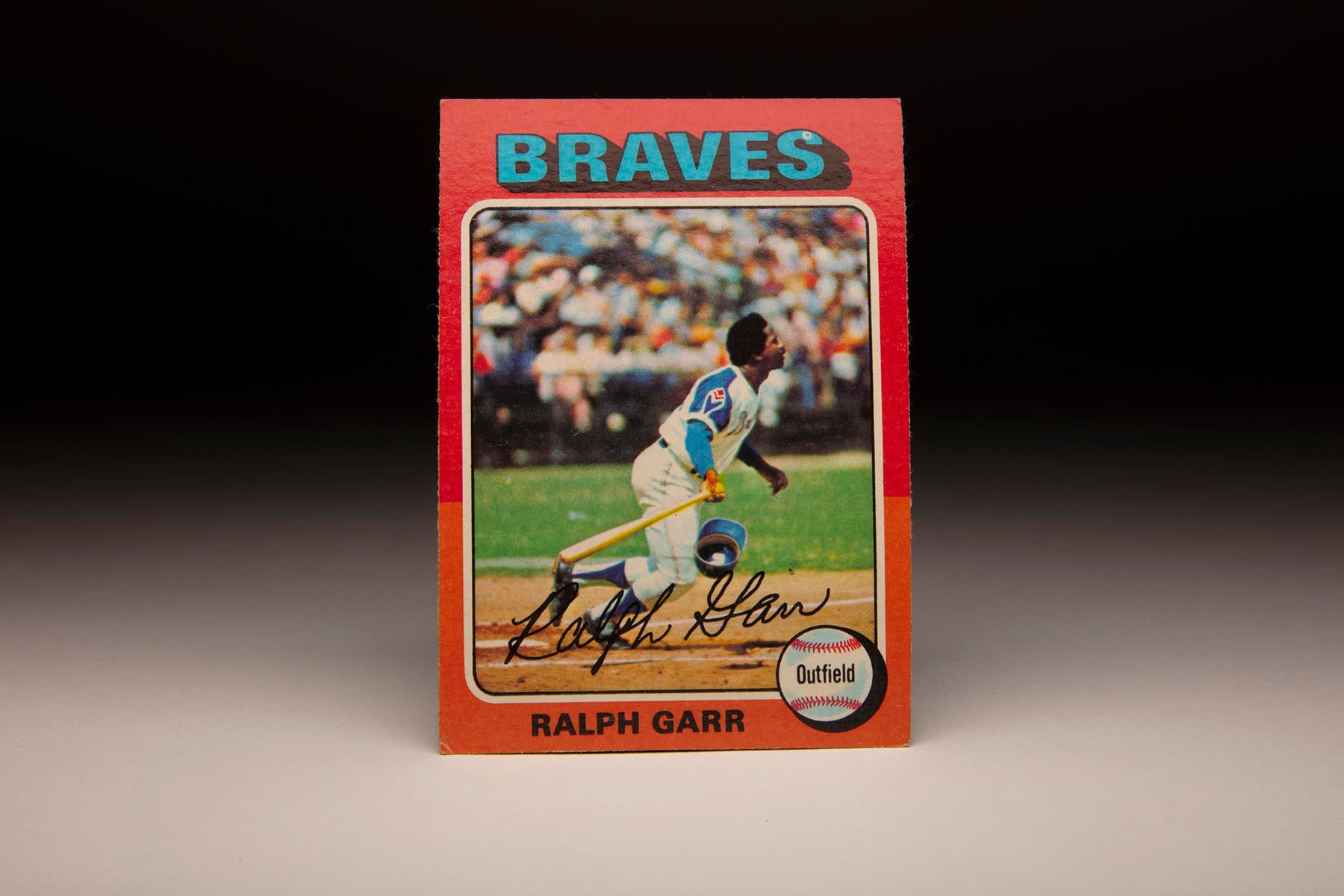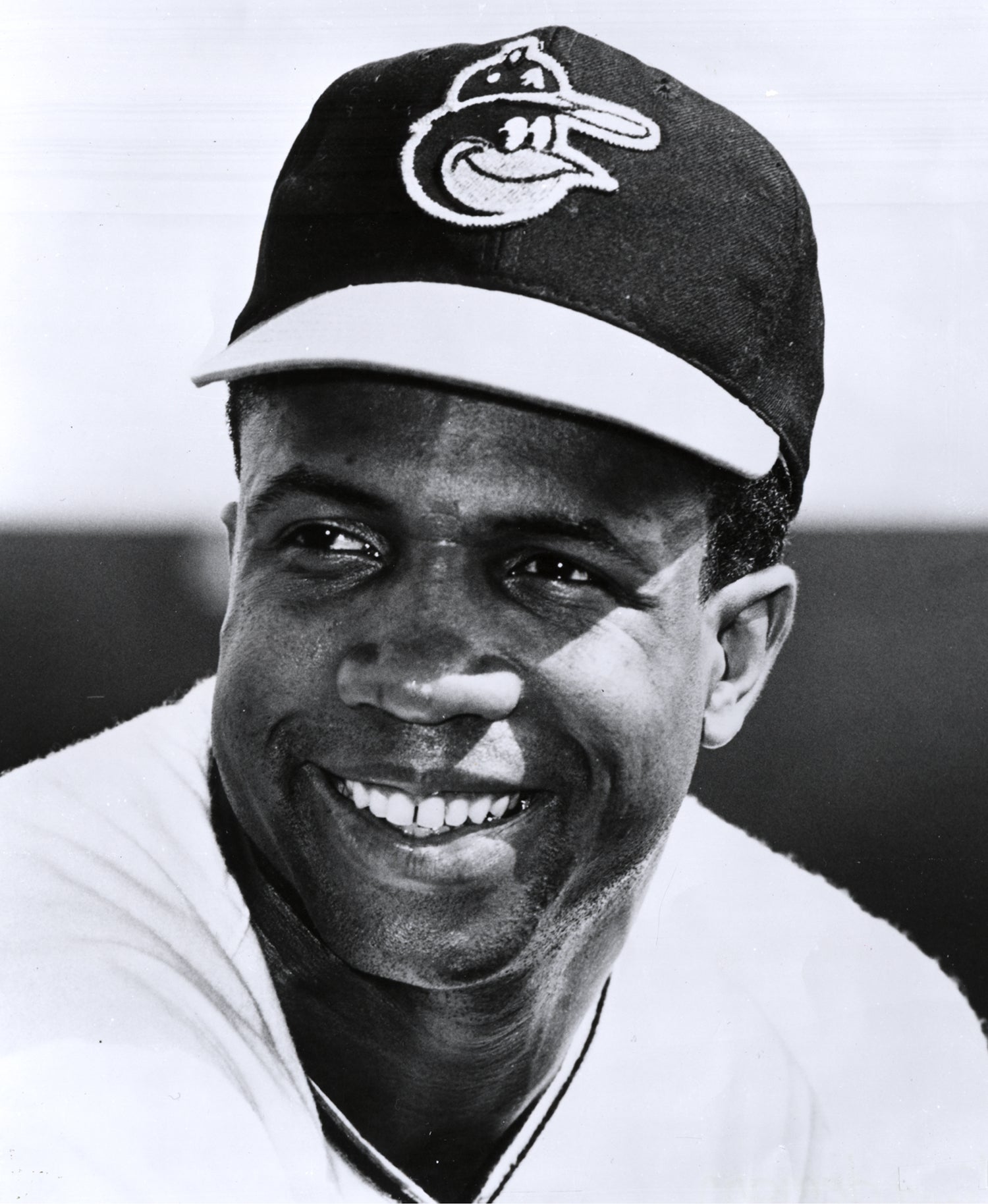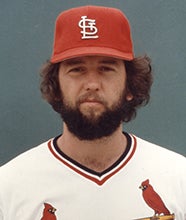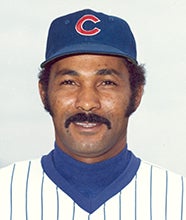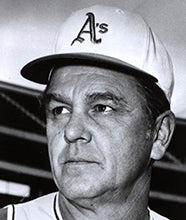- Home
- Our Stories
- #CardCorner: 1975 Topps Darold Knowles
#CardCorner: 1975 Topps Darold Knowles
The 1972-74 Oakland A’s won three straight World Series titles riding starting pitchers Catfish Hunter, Ken Holtzman and Vida Blue, with Rollie Fingers at the back of the bullpen to lock down games.
Aside from Fingers, only one other reliever pitched on all three of those championship teams. And though Darold Knowles saw action in only one of those three World Series, he carved his name into the record books – never to be erased.
Born two days after the attack on Pearl Harbor in 1941, Knowles was raised in Brunswick, Mo., located about 100 miles northeast of Kansas City. A three-sport letterman in baseball, basketball – he averaged 20 points a game his final two seasons – and track at Brunswick High School, Knowles established himself as a big league prospect with the Moberly Stamper Stars of the Central Missouri Ban Johnson League. In his first season at the age of 17, Knowles struck out 281 batters in 172.2 innings, including 32 in a 13-inning game that drew notice from big league scouts.
Knowles signed with the Baltimore Orioles in Feb. 9, 1961, after attending the University of Missouri for one semester. He was assigned to Class C Aberdeen of the Northern League that summer, going 11-5 with a 3.29 ERA in 22 starts. He returned to Class C ball for most of the 1962 season, going 12-7 with a 2.29 ERA for Stockton of the California League.
Hall of Fame Membership
There is no simpler, and more essential, way to demonstrate your support than to sign on as a Museum Member.
Be A Part of Something Greater
There are a few ways our supporters stay involved, from membership and mission support to golf and donor experiences. The greatest moments in baseball history can’t be preserved without your help. Join us today.
In 1963, Knowles pitched for Double-A Elmira – a team that featured future big leaguers like Curt Blefary, Davey Johnson, Tom Phoebus and Pat Gillick, who like Knowles was a lefty pitcher trying to stand out in a deep Orioles farm system. Knowles won a team-high 16 games with a 2.73 ERA.
In his first start for Elmira on April 22, Knowles and Elmira defeated Binghamton 1-0 despite 18 strikeouts from his mound opponent, Fred Norman – who would go on to pitch 16 years in the big leagues.
“(Triple-A Rochester manager) Darrell Johnson gave me (advice) in camp this spring, and I think it’s really helping my pitching,” Knowles told the Star-Gazette in Elmira following his impressive debut. “I’m only effective when I can keep the ball down and away from the hitters.”
He only saw action in one of the Athletics' three straight World Series victories - but Darold Knowles carved his name into the record books by appearing in all seven games of the 1973 Fall Classic. (Topps baseball card photographed by Milo Stewart Jr./National Baseball Hall of Fame and Museum)
With a feel for the game beyond his years, Knowles used his fastball-slider-changeup mix as a starter/reliever for Triple-A Rochester in 1964, going 6-7 with a 3.04 ERA in 136 innings despite batting a thigh injury that sidelined him three separate times. He pitched in Venezuela following the 1964 season and led the league in wins (13), strikeouts (170) and ERA (2.36).
“If I can get a good, honest shot, I think I can make it,” Knowles told the Evening Sun in Baltimore prior to the 1965 season.
Knowles made the Orioles’ Opening Day roster in 1965, but after allowing five earned runs in 1.2 innings of work over two games he was sent back to Triple-A. He was once again used as a starter/reliever in Rochester, going 11-5 with a 2.53 ERA.
On Aug. 18, Knowles was recalled to Baltimore – and he appeared in three games down the stretch in September.
Then on Dec. 6, 1965, the Orioles sent Knowles and outfielder Jackie Brandt to the Phillies in exchange for veteran reliever Jack Baldschun. Three days later, the Orioles reshaped their franchise destiny by sending Baldschun, Milt Pappas and Dick Simpson to the Reds in exchange for Frank Robinson.
“Left-handers are scarce,” Phillies general manager John Quinn told the Philadelphia Inquirer following the trade, “and we have good reports on Knowles from our scouts. I believe he has a chance to be one of our starting pitchers.”
But Phillies manager Gene Mauch quickly converted Knowles into a reliever and leaned on him heavily right out of the gate in 1966, as Knowles picked up his first big league win in the second game of the season with six innings of one-run relief against the Cardinals. By the end of August, Knowles had appeared in 62 games and had a 6-4 record with 13 saves and a 2.90 ERA. A sore arm limited him to seven appearances in September, and Mauch reportedly was concerned that he had worked Knowles so much that he would never regain his effectiveness.
On Dec. 1, the Phillies traded Knowles – whose 69 appearances in 1966 were 33 more than any other Phillies reliever – to the Senators in exchange for outfielder Don Lock.
“We improved ourselves through this trade,” Quinn told the Inquirer. Lock, however, was out of baseball by the end of the 1969 season.
Knowles was just getting started.
“It was 1966 and (Mauch) used me a lot,” Knowles told the Montreal Gazette later in his career. “I had a good year and worked in 69 games for him. Then they traded me after the season.
I heard that Mauch told people he thought he had wore me out that season and didn’t want to take a chance.”
As Washington’s busiest reliever in 1967, Knowles went 6-8 with 14 saves and a 2.70 ERA over 113.1 innings in 61 games. Then in January of 1968, Knowles – who was then teaching in the offseason – was called into active military duty when his Air Force National Guard unit was activated.
“After struggling through the minors and being traded twice, I’m finally in a position to make money,” Knowles told the Associated Press. “And now this happens.”
Knowles, who was stationed at Andrews Air Force Base, was able to pitch early in the 1968 season on night and weekend passes, appearing in 32 games with a 1-1 record, four saves and a 2.18 ERA.
But when his unit was deployed to Japan in July, Knowles missed the rest of the season.
His service ended on May 23, 1969, and Knowles quickly returned to the Senators. Three days after his discharge, Knowles was pitching for Washington. He did not allow an earned run in his first 12 appearances and worked in 53 games that year, going 9-2 with 13 saves and a 2.24 ERA – earning a berth in the All-Star Game and retiring the only two batters he faced in the Mid-Summer Classic.
By many metrics, Knowles was even better in 1970 – saving 27 games with a 2.04 ERA and 71 strikeout in what proved to be a career-high 119.1 innings. But Knowles was a hard-luck 2-14 over his 71 appearances for a Senators team that finished last in the AL East.
Knowles started the 1971 season 2-2 with two saves in 12 games – then was dealt to Oakland on May 8 along with Mike Epstein in exchange for Frank Fernandez, Paul Lindblad, Don Mincher and cash. Suddenly, Knowles found himself with one of the best young teams in baseball.
“Knowles is a stopper who is one of the best left-handed relievers in the league,” Athletics manager Dick Williams told the Associated Press. “We wanted him quite badly.”
Knowles went 5-2 with seven saves and a 3.59 ERA for Oakland as the A’s won the AL West title. Oakland was swept by Baltimore in the ALCS – with Knowles pitching just a third of an inning in his first postseason action – but the pieces were in place for what would become a dynasty.
In 1972, Knowles was 5-1 with 11 saves and a 1.37 ERA in 54 games. Fingers firmly grasped the fireman role in the Athletics’ bullpen that season, but Knowles had earned Williams’ trust and seemed poised to play a big role in the playoffs. But on Sept. 27 – one day before the A’s clinched the AL West crown – Knowles slipped while running to first base after hitting a fly ball against the Twins’ Bert Blyleven in the 10th inning of a scoreless game. Knowles thought the ball might fall for a hit and hustled out of the box, breaking his left thumb when he fell to the ground.
It cost Knowles a chance to pitch in the World Series, where the A’s defeated the Reds in seven games in one of the most competitive Fall Classics ever contested.
The A’s won their third straight AL West title in 1973 as Knowles went 6-8 with a 3.09 ERA and nine saves in 52 games, including starting five games – his first starts since 1967. He did not appear in Oakland’s five-game victory over the Orioles in the ALCS, an unusual occurrence as Williams worked his bullpen regularly.
But in the World Series, Knowles set a record (since tied) by appearing in all seven games against the Mets. He did not allow an earned run over 6.1 innings, picking up the save in Game 1 in relief of Fingers and recording the final out in Game 7 with the A’s leading 5-2. Though not a save situation, Knowles etched his name into history as a pitcher who recorded the final out of a World Series.
“That makes this one much more exciting for me,” Knowles told the Associated Press about comparing 1972 and 1973, noting that his teammate Reggie Jackson also missed the 1972 World Series with an injury. “I know how Reggie feels. I feel the same way.”
In 1974, with Williams having resigned following the 1973 World Series, Knowles had an uneven season even as the A’s repeated as AL West champions. Knowles was 3-3 with three saves and a 4.22 ERA in 45 games for new manager Al Dark – and was not called on to pitch in either the ALCS or the World Series.
With his three rings from the Athletics’ three straight titles in his pocket, Knowles left for Chicago after being traded with Bob Locker and Manny Trillo in a deal for future Hall of Famer Billy Williams on Oct. 23, 1974.
“Williams never let one bad outing bother him,” Knowles told the Sacramento Bee in 1974. “He’d come right back with me in relief the next day. “You knew where you stood with Dick, and that hasn’t turned out to be true with Alvin Dark.”
Knowles was used as the Cubs’ primary closer in 1975 but struggled to a 6-9 record and 5.81 ERA with 15 saves in 58 games. As future Hall of Famer Bruce Sutter took over the closer role in 1976, Knowles transitioned back to his most effective role as a set-up man – going 5-7 with nine saves and a 2.89 ERA in another 58 games.
At 35 years old entering Spring Training of 1977, Knowles was traded to the Rangers in exchange for Gene Clines.
“I knew the Cubs were looking to deal me,” Knowles told the Fort Worth Star-Telegram. “The good thing about it is that I knew I’d probably wind up with a contender. If a team’s not a contender, they’re rebuilding and they don’t have much use for a 35-year-old pitcher.”
The Rangers were expected to contend for the AL West title in 1977, but that spring Knowles suffered the first arm-use injury of his career when he strained a tendon in his arm. He would appear in just two games in April and a total of four after Aug. 31, finishing the season with a 5-2 mark and 3.22 ERA in 42 games as the Rangers rallied from a slow start to win 94 games and finish second in the division.
Following the season, Knowles pleaded guilty to a misdemeanor charge of misusing bank funds when he was entangled in business dealings that saw an associate land in federal prison. By that time, the Rangers had sold his contract to the Expos.
“At my age, I know that they (management) are looking for kids who can do the job,” Knowles told the Montreal Gazette in Spring Training of 1978. “I’ve never questioned my ability, though. I am not an overpowering pitcher, but I know how to get my job done.
“Someone once told me that the hitters will let me know when I’m through, and I guess that’s true. It’s not time yet.”
Knowles was correct. With Williams as his manager again, Knowles went 3-3 with a 2.38 ERA and six saves in 60 games. He became a free agent following the season and signed a two-year deal with the Cardinals.
“I grew up in Missouri,” Knowles told the Associated Press. “I’ve always wanted to be a St. Louis Cardinal.”
But Knowles struggled to recapture his Montreal form in St. Louis, going 2-5 with a 4.07 ERA in 48 games in 1979. He made history again, however, when on Aug. 2 he appeared in his 751st game – surpassing the previous record for a left-hander held by Warren Spahn.
After two games in 1980, the Cardinals released him on May 9.
Knowles immediately went to work as a coach in the Cardinals’ minor league system, spending nearly a decade in various roles before becoming the Phillies’ pitching coach in 1989 and 1990. He returned to the minor leagues with the Phillies starting in 1991 and spent a decade there before taking jobs with Pittsburgh and Toronto.
“He knows me as a pitcher better than anybody,” future All-Star Terry Mulholland told the Philadelphia Inquirer about Knowles. “If I’m ever struggling, I’d call him.”
Knowles finished his big league career with a record of 66-74 with a 3.12 ERA and 143 saves in 765 games.
“In those days, you broke your way in as a reliever,” Knowles said of his ascension to the big leagues. “The bullpen had guys trying to break into the rotation or other guys on their way out. It was about that time that teams started concentrating on the bullpen.
“I just fit into that scheme and I’ve never minded since.”
Craig Muder is the director of communications for the National Baseball Hall of Fame and Museum

